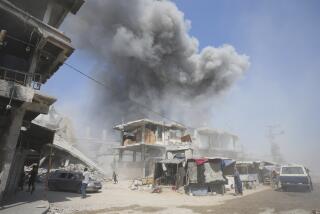Croat Offensive Shatters Peace; U.N. Forces Held
- Share via
ZAGREB, Croatia — In the first major warfare here in almost two years, Croatian troops in tanks, backed by jet fighters, battled rebel Serbs on Monday for control of a transnational highway. Scores of U.N. peacekeepers were captured or attacked by one side or the other.
The Croatian assault by land and air on U.N.-protected Serbian enclaves in central and southern Croatia claimed an undetermined number of casualties and threatened to escalate into a much wider conflict.
It shattered the relative peace between Croats and Serbian separatists, who seized one-third of Croatian territory in a 1991 war that claimed 10,000 lives before ending in a U.N.-brokered cease-fire in 1992.
“This is the most dangerous development in Croatia in two years,” said U.N. spokesman Chris Gunness.
More than 2,000 Croatian troops marched across U.N. cease-fire lines and into a Serb-held pocket 70 miles southeast of Zagreb to retake control of a highway that links Zagreb with Belgrade, the Serbian capital, that was closed by Serbs over the weekend.
Serbs mobilizing from farther south shelled Croatian towns as Croatian troops captured Serb-controlled territory and advanced toward the Serbian stronghold of Okucani.
Croatian MIG warplanes targeted a Serb-held bridge on the Sava River that forms Croatia’s border with Bosnia-Herzegovina in an apparent attempt to cut off potential Serbian reinforcements from Bosnia, U.N. observers said. The bombs missed their targets, the observers added.
Angry at what they saw as the failure of the United Nations to protect them, the Serbs detained 115 U.N. peacekeepers, including 30 civilian police officers in Okucani, possibly to use them as human shields, U.N. officials said.
And Croatian troops in another Serbian enclave in southern Croatia seized three U.N. observation posts, ejecting the forces who staffed them, and surrounded five more in what U.N. officials described as a tense standoff. It appeared that the Croats might be moving into position to take on the Serbs there too.
At least three U.N. peacekeepers were seriously wounded in shelling, the United Nations said.
The sudden outbreak of fighting in Croatia alarmed many here and came as most world attention was focused on neighboring Bosnia, where a four-month, widely ignored cease-fire expired Monday.
Although the former Yugoslav federation has become synonymous with ethnic bloodshed, no significant violence had been reported in Croatia since September, 1993. But tensions have simmered.
The government of President Franjo Tudjman, increasingly impatient for Serb-held land to be restored to Croatian control, recently forced the United Nations to agree to reduce its presence here. Diplomats suggested that the move was intended to give the Croatian army a freer hand to clamp down on the Serbs.
Croatia’s minority Serb community rebelled when the country declared its independence from the Yugoslav federation in 1991. It has carved out its own self-styled “republic” in the Krajina region of Croatia and has steadfastly refused to be governed by Croats. The Croatian government, meanwhile, has steadfastly insisted that Croatia be reunified.
The enclave attacked Monday straddles 16 miles of the highway from Zagreb to Belgrade. It is one of several rebel Serb areas protected by U.N. monitors under the cease-fire agreement but the one considered most susceptible to reclamation by Croatian forces because more than half the people living there are Croats.
The pocket, known as Western Slavonia, also has the weakest ties to the hard-line Krajina Serb leadership, based in the southern Croatian village of Knin; Western Slavonia is not physically contiguous with the rest of the Krajina, making its defense more difficult.
Most important to the Croatian government are the highway and railway through the area, principal economic links for the country.
The road was only reopened in December, for the first time since the 1991 war, in a much-heralded first step toward fuller reconciliation between Croats and the Krajina Serbs.
The open highway was meant to be a cornerstone of a broader agreement on economic and political cooperation between the two factions--an agreement drafted largely by U.S. and Russian diplomats--and it had become an important symbol of reunification. Families divided by the borders of war had begun holding reunions along the road.
But the Serbs closed the highway over the weekend after shooting three Croatian motorists to death in retaliation for the stabbing death of a Serb by a Croat.
Reopening the road was the chief goal of Monday’s military offensive, the Tudjman government insisted. “This is a very limited act meant only to secure safe passage on the highway and to stop further terrorist acts,” a government spokeswoman said.
But diplomats and other analysts saw a larger goal in which the government is determined finally to end a state-within-a-state situation. They suggested that Croatia is acting now because the end of the Bosnian cease-fire will mean Bosnian Serbs are more likely to be engaged in fighting the Muslim-led Bosnian government and less able to rally to the defense of their Croatian Serb brothers.
Croatia is also thought to be taking advantage of a period of uncertainty over the U.N. mandate. The harassment suffered by U.N. forces Monday further jeopardizes their precarious mission. France, Britain and other countries have hinted they may abandon the Balkans as the U.N. effort appears increasingly ineffective.
More to Read
Sign up for Essential California
The most important California stories and recommendations in your inbox every morning.
You may occasionally receive promotional content from the Los Angeles Times.














